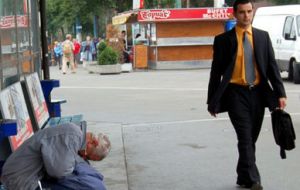MercoPress. South Atlantic News Agency
UK richest fifth have gross income 16 times higher than the poorest fifth
 Taxes and benefit narrow the rich/poor income gap to four times
Taxes and benefit narrow the rich/poor income gap to four times The gap between the rich and poor in the United Kingdom remained at a high level in 2007-8, official statistics have shown. The richest fifth of the population had an income, before tax and benefits, 16 times greater than the poorest fifth.
The widening inequality in disposable income seen during the previous three years has halted, the Office for National Statistics figures indicated. During that period, salaries and investment income among higher earners rose faster than for the poorest.
The ONS said there had been a sharp rise in income inequality in the late 1980s. Despite the levelling off, this change had not been reversed.
“During the 1990s and 2000s, there were periods of both rising and falling inequality, but the level of inequality remained high by historical standards,” the ONS report said.
The statistics authority analysed the effect that taxes and benefits had on household income in the UK.
Those households in the top fifth bracket had an original income - gross income excluding taxes and benefits - of £72,600. This was nearly 16 times bigger than the household original income for those in the bottom fifth of the population, at £4,700.
The effect of taxes and benefits narrowed the gap, down to a ratio of four to one.
Taking the tax and benefit system into account, the final household income for the top fifth fell to £52,400 a year, compared with the bottom fifth which saw income rise to £14,300.
Single parents gain from the benefits system. Before this is taken into account their household income was an average of £11,000 a year; afterwards it was £22,900.
Most other non-retired households paid more in tax than they received in benefits, although cash benefits meant that those with children benefited more than those without.
Pensioners also won from this redistribution, with their final household income rising by £9,100 to £22,200 after benefits have been added and tax deducted.
Those in the bottom two-fifths of income levels received 57% of cash benefits such as Income Support, Pension Credit, Child Benefit and Incapacity Benefit.
These benefits made up more than half (58%) of the income of the poorest fifth of the population and 2% of the richest fifth.
The richest members of society paid a bigger proportion in direct taxes, such as income tax, while the poorest pay a higher proportion of indirect taxes, such as VAT.
Health services and education provided by the state are known as benefits in kind. The ONS has calculated that the financial equivalent of these benefits was £7,500 for the poorest fifth of the population and £4,100 in the top fifth.
This benefits pensioners and households with children who were more likely to need to use these services.
The findings contrast a report in October last year by the Organisation for Economic Co-operation and Development (OECD) which concluded that the decline in inequality in Britain had been “remarkable” since the turn of the decade.
But the report said the UK still had one of the highest levels of income inequality in the developed world. (BBC).-




Top Comments
Disclaimer & comment rulesCommenting for this story is now closed.
If you have a Facebook account, become a fan and comment on our Facebook Page!